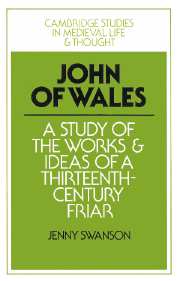Book contents
- Frontmatter
- Contents
- Acknowledgements
- List of Abbreviations
- Introduction
- 1 The career of John of Wales
- 2 The works of John of Wales: sources and technique
- 3 The Breviloquium de Virtutibus Antiquorum Principum et Philosophorum
- 4 Communiloquium, part 1: John of Wales on the state and its members
- 5 Communiloquium, parts 2 and 3: John of Wales on secular society
- 6 Communiloquium, parts 4–7: John of Wales on scholars and churchmen
- 7 Philosophers and saints: the Compendiloquium and Breviloquium de Sapientia Sanctorum of John of Wales
- 8 The works of John of Wales: spread and influence
- Conclusion
- Appendices
- 5 Checklist of early printed editions of works by John of Wales
- Bibliography
- Index
4 - Communiloquium, part 1: John of Wales on the state and its members
Published online by Cambridge University Press: 23 September 2009
- Frontmatter
- Contents
- Acknowledgements
- List of Abbreviations
- Introduction
- 1 The career of John of Wales
- 2 The works of John of Wales: sources and technique
- 3 The Breviloquium de Virtutibus Antiquorum Principum et Philosophorum
- 4 Communiloquium, part 1: John of Wales on the state and its members
- 5 Communiloquium, parts 2 and 3: John of Wales on secular society
- 6 Communiloquium, parts 4–7: John of Wales on scholars and churchmen
- 7 Philosophers and saints: the Compendiloquium and Breviloquium de Sapientia Sanctorum of John of Wales
- 8 The works of John of Wales: spread and influence
- Conclusion
- Appendices
- 5 Checklist of early printed editions of works by John of Wales
- Bibliography
- Index
Summary
The Communiloquium is the second in John's series of loquia, having been written after his Breviloquium de Virtutibus and before his Compendiloquium. It was substantially completed before Aquinas wrote his commentary on Aristotle's Politics c. 1269/72; at least, Communiloquium makes no reference to this highly relevant work. However, it does make use of rare sources which were available in Paris by the mid-1260s, so it must have been completed some time after 1266, as its predecessor, the Breviloquium de Virtutibus, also has a few passing references to some of these sources. There is no evidence that these sources also became available in Oxford before 1270, by which time Communiloquium must have been practically completed, so we can conclude that Communiloquium was partly produced in Paris and that John was already in France before his first recorded appearance there in June 1270. I say ‘partly produced’ in Paris because many of the sources used in Communiloquium are characteristic of Oxford and are not known to have been available in Paris in the 1260s or early 1270s. So it is possible that John found the inspiration for Communiloquium in Oxford and had already prepared the outline and gathered together some of the material before he transferred to Paris some time in the mid- to late 1260s. Communiloquium, then, was produced between c. 1265 and 1269/70.
- Type
- Chapter
- Information
- John of WalesA Study of the Works and Ideas of a Thirteenth-Century Friar, pp. 63 - 106Publisher: Cambridge University PressPrint publication year: 1989



